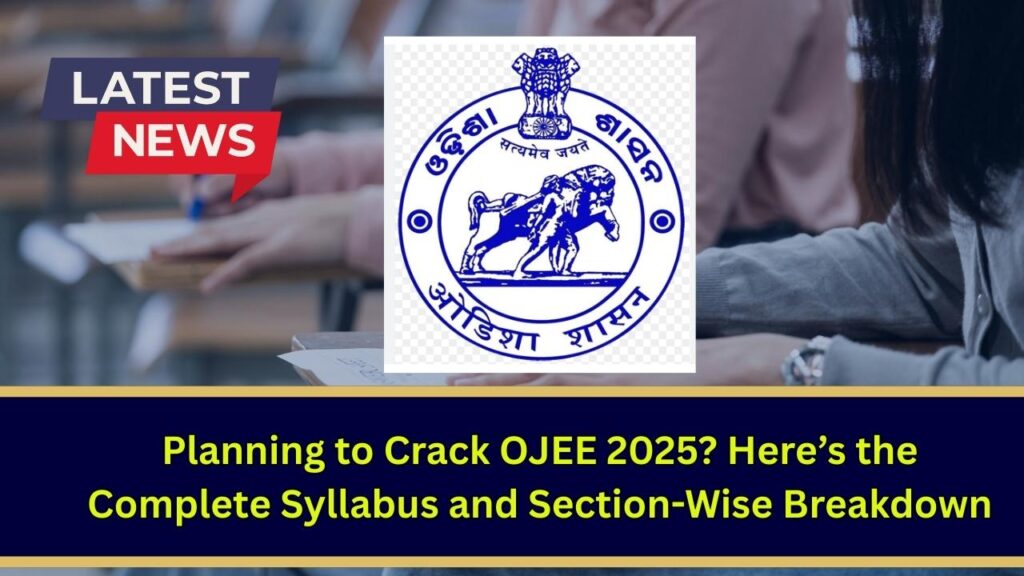Planning to Crack OJEE 2025 – If you’re aiming to excel in the Odisha Joint Entrance Examination (OJEE) 2025, understanding the detailed syllabus is crucial for effective preparation. OJEE is a state-level entrance exam conducted by the Odisha Joint Entrance Examination Board (OJEEB) for admission into various undergraduate and postgraduate courses in Odisha. This comprehensive guide provides a section-wise breakdown of the OJEE 2025 syllabus across various programs, ensuring you’re well-equipped to tackle the exam confidently.

Planning to Crack OJEE 2025
| Feature | Details |
|---|---|
| Exam Dates | May 2 to May 11, 2025 |
| Exam Mode | Computer-Based Test (CBT) |
| Courses Covered | B.Pharm, B.Tech (Lateral Entry), MBA, MCA, M.Tech, M.Arch, M.Plan, M.Pharm, Integrated MBA |
| Question Type | Multiple Choice Questions (MCQs) |
| Marking Scheme | +4 for correct answer, -1 for incorrect answer |
| Official Website | ojee.nic.in |
Preparing for OJEE 2025 requires a solid understanding of the syllabus and strategic planning. With the right resources and consistent practice, aspirants can confidently approach the exam. This guide serves as a one-stop reference for every topic and section covered in OJEE 2025, helping students chart a clear path to success.
OJEE 2025 Syllabus: Course-Wise Breakdown
1. B.Pharm / BAMS / BHMS
Subjects: Physics, Chemistry, and Mathematics or Biology (as per candidate’s choice).
- Physics Topics:
- Measurements and Motion
- Heat and Thermodynamics
- Characteristics of Materials
- Liquids
- Electricity and Magnetism
- Wave Motion
- Optics
- Electronic Devices
- Atomic and Nuclear Physics
- Chemistry Topics:
- Some Basic Concepts in Chemistry
- States of Matter
- Atomic Structure
- Chemical Bonding and Molecular Structure
- Chemical Thermodynamics
- Solutions
- Equilibrium
- Redox Reactions and Electrochemistry
- Chemical Kinetics
- Surface Chemistry
- Organic Compounds and Biomolecules
- Mathematics Topics:
- Algebra
- Trigonometry
- Analytical Geometry
- Calculus
- Vectors
- Probability and Statistics
- Biology Topics:
- Diversity of Living World
- Structural Organisation in Animals and Plants
- Cell Structure and Function
- Plant Physiology
- Human Physiology
- Reproduction
- Genetics and Evolution
- Biology and Human Welfare
- Biotechnology and Its Applications
- Ecology and Environment
2. MBA / Integrated MBA
- Quantitative Techniques: Arithmetic, Algebra, Geometry, Trigonometry, Mensuration, Probability, Time-Speed-Distance, Data Interpretation, Number Systems.
- Analytical & Logical Reasoning: Coding-Decoding, Series, Blood Relations, Puzzles, Statements and Assumptions, Arrangements.
- Verbal Reasoning & Comprehension: Grammar, Synonyms/Antonyms, Sentence Correction, Reading Comprehension, Vocabulary Usage.
- General Awareness & Business Fundamentals: Current Affairs, Business General Knowledge, Economic Policies, Prominent Organisations, Static GK.
3. MCA
- Mathematics:
- Logic
- Algebra of Sets
- Number System
- Determinants and Matrices
- Trigonometry
- Coordinate Geometry
- Quadratic Polynomials
- Sequence and Series
- Vectors
- Differential and Integral Calculus
- Differential Equations
- Probability and Statistics
- Computer Awareness:
- Introduction to Computer
- Computer Arithmetic
- C Language
- C++ and Data Structures
- Fundamentals of Computer Organization and Networking
- Introduction to Operating Systems
- Logical Reasoning and Verbal Abilities
4. Lateral Entry B.Tech (Diploma Holders)
- Basic Electrical Engineering:
- Fundamentals of Electrical Engineering
- AC Theory
- Generation of Electrical Power
- Conversion of Electrical Energy
- Wiring and Power Billing
- Measuring Instruments
- Storage Devices
- Mathematics:
- Algebra
- Determinants and Matrices
- Trigonometry
- Vector Algebra
- Calculus
- Ordinary Differential Equations
- Coordinate Geometry of Three Dimensions
- Probability and Statistics
- Engineering Mechanics:
- Force and Moments
- Center of Gravity and Moment of Inertia
- Friction
- Gear Drive
- Lifting Machines
- Stress and Strain
- Dynamics
5. Lateral Entry B.Tech (B.Sc. Students)
- Mathematics:
- Logic
- Algebra of Sets
- Number System
- Determinants and Matrices
- Trigonometry
- Coordinate Geometry
- Quadratic Polynomials
- Sequence and Series
- Differential and Integral Calculus
- Differential Equations
- Probability and Statistics
- Physics:
- Mechanics
- Oscillations
- Motion of Charged Particles in Electric and Magnetic Fields
- Electrostatics
- Electric Currents
- Magnetostatics
- Time Varying Fields
- Electromagnetic Waves
- Kinetic Theory of Matter
- Thermodynamics
- Physical Optics
- Quantum Mechanics
- Solid State Physics
- Semiconductor Devices
- Chemistry:
- Stereochemistry of Organic Compounds
- Thermochemistry
- Electrochemistry
- Thermodynamics
- Chemical Equilibrium
- Atomic Structure
- Phase Equilibrium
- Periodic Properties
- Chemical Bonding
- Chemistry of Noble Gases
- Acids and Bases
- Coordination Compounds
- Structure, Bonding, and Mechanism of Organic Reactions
6. M.Tech / M.Plan / M.Arch / M.Pharm
- Common Sections:
- Analytical and Logical Reasoning:
- Data Interpretation
- Time and Sequence
- Series
- Codes
- Engineering Mathematics:
- Ordinary Differential Equations
- Linear Algebra
- Analytical and Logical Reasoning:
Preparation Tips for OJEE 2025
- Start Early: Begin your preparation 6-8 months before the exam.
- Understand the Pattern: Familiarize yourself with question types and scoring system.
- Use NCERT Books: Especially for B.Pharm and science-related sections.
- Take Mock Tests: Simulate real-exam conditions with online mock exams.
- Solve Previous Papers: Practice from past 5-year OJEE papers.
- Focus on Time Management: Develop strategies to complete each section within time limits.
PPSC PCS Admit Card 2025 Releasing Soon—Prelims Exam Notice Expected Any Moment!
Stuck on Geography & Agriculture for RRB 2025? These MCQs Will Clear All Your Doubts Instantly!
Breaking: NEET UG 2025 Exam Cities Revealed—This Unexpected Twist Has Students Talking
FAQs about Planning to Crack OJEE 2025
Q1: What is the official website for OJEE 2025?
A: The official website is https://ojee.nic.in
Q2: Is there negative marking in OJEE 2025?
A: Yes, 1 mark is deducted for every incorrect answer.
Q3: Can a B.Sc student apply for Lateral Entry to B.Tech through OJEE?
A: Yes, B.Sc. graduates can apply for Lateral Entry B.Tech under specific criteria.
Q4: Are calculators allowed in the OJEE exam?
A: No, the use of calculators or any electronic device is prohibited.
Q5: How many questions are there in OJEE MBA?
A: OJEE MBA has 120 questions divided into 4 sections.








